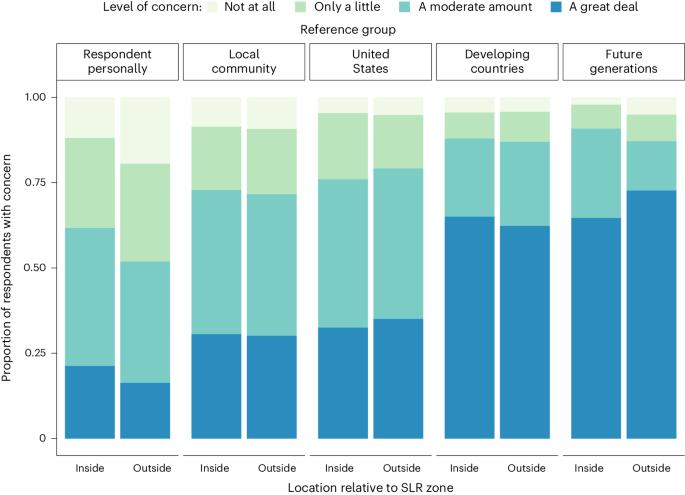利用地图宣传海平面上升的意外后果
IF 27.1
1区 环境科学与生态学
Q1 ENVIRONMENTAL SCIENCES
引用次数: 0
摘要
气候变化引起的海平面上升造成了巨大的社会和经济损失,但各国政府和沿海居民仍未采取必要的减缓和适应措施来保护他们的社区和财产。为此,倡导者们试图通过传播预计海平面上升的地图来提高威胁的显著性。我们使用两个高空间分辨率调查实验(n = 1,243)来检验这种无处不在的传播工具的效果。我们的第一个实验在美国四个州的沿海社区进行,向海平面上升预测边界两侧的家庭展示了为其量身定制的风险地图。我们发现,这种常见的风险交流方式无意中降低了人们对未来海平面上升的担忧,即使是在预计本世纪将遭遇洪水的家庭中也是如此。在我们对旧金山湾区沿海居民样本(n = 737)进行的第二次实验中,关于对交通模式影响的直接沟通确实增加了人们对未来气候影响的担忧。基于地图的风险信息增加了对气候适应集体支出的支持,但并没有增加个人的捐助意愿。我们的研究结果表明了对气候适应信息宣传进行实证测试的重要性。让沿海居民了解海平面上升的风险可能很困难。本研究发现,向个人展示自上而下的未来海平面边界地图可能会适得其反,无法让居民关注气候影响。本文章由计算机程序翻译,如有差异,请以英文原文为准。

Unintended consequences of using maps to communicate sea-level rise
Sea-level rise caused by climate change poses enormous social and economic costs, yet governments and coastal residents are still not taking the mitigation and adaptation steps necessary to protect their communities and property. In response, advocates have attempted to raise threat salience by disseminating maps of projected sea-level rise. We test the efficacy of this ubiquitous communication tool using two high spatial-resolution survey experiments (n = 1,243). Our first experiment, in US coastal communities across four US states, exposes households on either side of projected sea-level rise boundaries to individually tailored risk maps. We find this common risk communication approach has the unintended consequence of reducing concern about future sea-level rise, even among households projected to experience flooding this century. In a second experiment on our sample (n = 737) of San Francisco Bay Area coastal residents, direct communications about impacts on traffic patterns does increase concern about future climate impacts. Map-based risk information increases support for collective spending on climate adaptation, but it does not increase individual intentions to contribute. Our results demonstrate the importance of empirically testing messaging campaigns for climate adaptation. Getting coastal residents to understand the risk of rising sea levels can be difficult. This study finds that showing individuals top-down maps of future sea-level boundaries can be counterproductive to making residents concerned about climate impacts.
求助全文
通过发布文献求助,成功后即可免费获取论文全文。
去求助
来源期刊

Nature Sustainability
Energy-Renewable Energy, Sustainability and the Environment
CiteScore
41.90
自引率
1.10%
发文量
159
期刊介绍:
Nature Sustainability aims to facilitate cross-disciplinary dialogues and bring together research fields that contribute to understanding how we organize our lives in a finite world and the impacts of our actions.
Nature Sustainability will not only publish fundamental research but also significant investigations into policies and solutions for ensuring human well-being now and in the future.Its ultimate goal is to address the greatest challenges of our time.
 求助内容:
求助内容: 应助结果提醒方式:
应助结果提醒方式:


